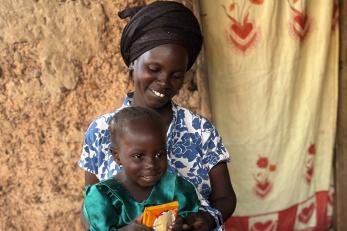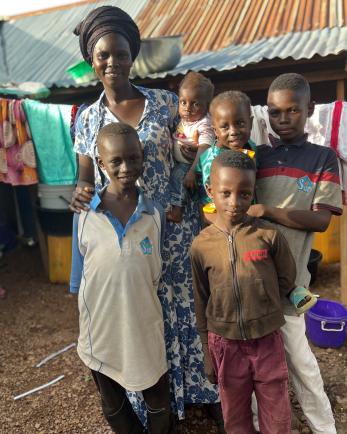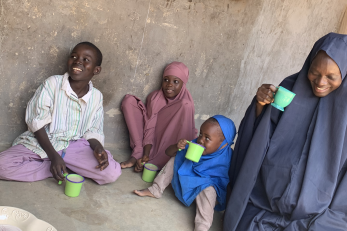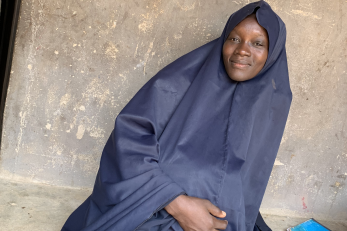Rural resilience activity nourishes northern Nigeria with locally manufactured nutrient-dense foods

“This one used to worry me a lot”, Zainab Atiku says, as she points to her daughter, Azara. She recounts that Azara used to face frequent illness, often accompanied by distressing rashes all over her body. Zainab works as an environmental sanitation worker for a local company, yet as a single mother of 6 children, it has not been easy to feed all her children, let alone spare nutritious food for Azara to recover. “I used to be under a lot of stress to see her like that”, Zainab confessed. “I could not go to sleep because I kept thinking about what to feed my children the next day.”
Malnutrition among children is one of the most pressing issues Nigeria faces. Just like Azara, at least 17 million Nigerian children are undernourished; stunted, and/or wasted, giving Nigeria the second-highest burden of malnutrition in the world. The brunt of this problem falls disproportionately on the Northern states, particularly the conflict-affected regions of Northeast Nigeria. Many donors and organizations as well as the Federal and State Governments of Nigeria have taken notice of this issue, evident from the intense presence of humanitarian nutrition assistance programs from multiple organizations.
To address this issue, the Feed the Future Nigeria Rural Resilience Activity (RRA), funded by USAID, adopted an innovative approach to the issue of malnutrition by supporting local nutrition-sensitive businesses to expand instead of direct assistance. Implemented by Mercy Corps, in partnership with the International Fertilizer Development Center and Save the Children International, RRA attracts private-sector players to invest in Northeast Nigeria to combat the vicious cycle of poverty and hunger.
One such partner is Halilco Foods, which collaborates with smallholder millet farmers to enhance the supply of iron and zinc-enriched millet for the manufacturing of nutritious food products. Their flagship product is called Instant Koko, a porridge powder that can be easily made by mixing it with hot water. Instant Koko, rich in micronutrients and minerals that are often lacking from the diet of many in Northeast Nigeria, can not only provide the necessary energy for an affordable cost with more ease but also aid recovery from micronutrient deficiencies. RRA teamed up with Halilco Foods to make Instant Koko readily available by establishing a distribution chain with local sales agents and co-creating mass marketing strategies to target specific audiences, such as through events for mothers and pregnant women.
“I used to make millet puff in the morning for my children’s breakfast. Now I have switched to Instant Koko”, says Zainab. “It’s sweet”, she adds, “It gives them strength and helps them grow. And it is less time-consuming to cook in the morning”. Zainab notes the visible changes in her children, with increased weight and softer skin. For Azara, Instant Koko has brought about newfound health and energy. “She used to follow me, wanting me to carry her. Now, look at her. She is so active, and plays with her siblings”, Zainab said with a smile watching Azara run out of the gate, following her brother.
With millet prices on the rise, a sachet of Instant Koko now costs approximately half as much as the equivalent amount of millet required for breakfast. The affordability and high nutrition content of Instant Koko support individuals like Zainab to meet the nutrition needs of the family, providing significant relief in the face of escalating food costs.
“I feel very happy about the way my children are growing stronger without falling ill”, Zainab smiles.

Another avid user of Instant Koko is a pregnant mother in Maiduguri, Zainab Abubakar, who even started to sell Instant Koko after seeing the positive impact it has on her family. Zainab's story began with a sense of frustration. “I used to feel disheartened whenever people criticized the health of my children and myself, saying that we are negligent in providing the proper nourishment. However, the reality is that obtaining the necessary nutritious food for the children is expensive due to the high cost of living”, Zainab confesses with a sense of vulnerability.

Zainab has noticed several positive changes since she began cooking Instant Koko for her family. “My children are now much happier, healthier, and stronger, especially my younger child, who has become incredibly active”, she smiles. “People now perceive me as a mother with healthy and happy children. Moreover, others in the community have witnessed positive transformations, prompting many to inquire about and purchase (Instant) Koko”, Zainab recounts joyfully. Her goal now is to keep her children healthy and strong and ensure that her children can become valuable contributors to their community by achieving their dream of becoming doctors.

Through this partnership, RRA and Halilco Foods aim to make Instant Koko and other nutrient-rich products available to at least 7,000 households like both of Zainabs’ at an affordable price in Northeast states by the end of the year 2023, with many more in sight.